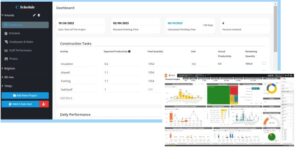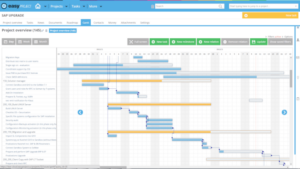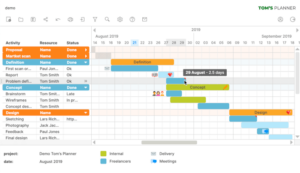Best construction accounting software is essential for any modern construction business. It helps you manage your finances, track your projects, and stay on top of your bottom line. Construction companies face unique challenges in managing their finances, from complex job costing to fluctuating project timelines and unpredictable weather.
Construction accounting software is designed to address these challenges by providing a comprehensive suite of tools for managing every aspect of your business. From job costing and budgeting to time and expense tracking, invoice management, and payment processing, these solutions offer a streamlined approach to managing your finances and achieving profitability.
Introduction
Construction accounting software is a crucial tool for modern construction businesses. It helps them streamline financial processes, improve accuracy, and make better decisions. Construction companies face several challenges in managing their finances, including:* Complex projects:Construction projects often involve multiple subcontractors, materials, and labor costs, making it difficult to track expenses accurately.
Fluctuating costs
Material prices, labor rates, and fuel costs can change frequently, making it challenging to budget effectively.
Cash flow management
Construction companies often have to deal with long payment cycles, which can lead to cash flow problems.
Compliance with regulations
Construction companies must comply with various tax and regulatory requirements, which can be complex and time-consuming.
Benefits of Construction Accounting Software
Construction accounting software offers numerous benefits to construction companies, including:* Improved accuracy:Software helps automate tasks like expense tracking, invoicing, and payroll, reducing the risk of human error.
Enhanced efficiency
Software streamlines processes, allowing construction companies to manage their finances more efficiently and save time.
Better visibility
Software provides real-time insights into financial performance, allowing companies to make informed decisions.
Improved cash flow management
Software helps companies track receivables, payables, and project costs, enabling better cash flow management.
Simplified compliance
Software automates tasks related to tax and regulatory compliance, reducing the burden on companies.
Key Features of Construction Accounting Software
Construction accounting software is designed to streamline financial management for construction businesses, providing a comprehensive suite of tools to handle various financial tasks. From tracking project costs to generating financial reports, these software solutions help construction companies gain better control over their finances and make informed decisions.
Job Costing
Job costing is a crucial aspect of construction accounting, as it allows businesses to track the expenses incurred on each project. Construction accounting software facilitates job costing by providing features to:
- Track project expenses:The software enables you to categorize and track all expenses related to a specific project, including labor, materials, equipment, and subcontractors.
- Allocate costs to different phases:You can allocate costs to different project phases, such as planning, construction, and completion, providing a detailed breakdown of expenses over the project lifecycle.
- Calculate project profitability:By tracking expenses and revenue for each project, the software can automatically calculate project profitability, helping you identify profitable and unprofitable projects.
Budgeting and Forecasting
Construction accounting software empowers businesses to create accurate budgets and forecasts for projects, ensuring financial stability and efficient resource allocation. Key features include:
- Create detailed budgets:The software allows you to create detailed budgets for each project, including estimated costs for labor, materials, equipment, and overhead.
- Track budget variances:You can monitor actual expenses against budgeted amounts, identifying any variances and taking corrective actions to stay within budget.
- Generate financial forecasts:The software can generate financial forecasts based on historical data and current project budgets, providing insights into future financial performance.
Time and Expense Tracking
Construction accounting software streamlines time and expense tracking, ensuring accurate records and efficient cost management. Key features include:
- Track employee time:The software allows employees to track their time spent on different projects and tasks, providing accurate data for payroll and project costing.
- Capture expenses:Employees can easily record expenses incurred while working on projects, such as travel, meals, and materials, ensuring accurate expense reporting.
- Generate time and expense reports:The software generates comprehensive time and expense reports, providing insights into labor costs, project expenses, and employee productivity.
Invoice Management
Construction accounting software simplifies invoice management, ensuring timely billing and efficient cash flow. Key features include:
- Create professional invoices:The software enables you to create professional invoices with customized templates, including company logo, contact information, and project details.
- Track invoice status:You can monitor the status of invoices, including whether they have been sent, viewed, or paid, providing visibility into outstanding payments.
- Generate payment reminders:The software can automatically send payment reminders to clients, reducing late payments and improving cash flow.
Payment Processing
Construction accounting software integrates with payment processing systems, streamlining payment collection and reconciliation. Key features include:
- Accept online payments:The software allows you to accept online payments from clients through various payment gateways, making it convenient for both parties.
- Reconcile payments:The software automatically reconciles payments received with invoices, reducing manual effort and ensuring accurate accounting records.
- Manage bank accounts:You can manage multiple bank accounts within the software, enabling you to track deposits, withdrawals, and bank balances.
Reporting and Analytics, Best construction accounting software
Construction accounting software provides comprehensive reporting and analytics capabilities, enabling businesses to gain insights into their financial performance and make informed decisions. Key features include:
- Generate financial reports:The software generates various financial reports, including balance sheets, income statements, cash flow statements, and project profitability reports.
- Analyze financial data:You can analyze financial data to identify trends, areas of improvement, and potential risks, enabling proactive financial management.
- Customize reports:The software allows you to customize reports based on your specific needs, providing the information you require to make informed decisions.
Benefits of Using Construction Accounting Software
Construction accounting software offers a comprehensive solution for managing the complex financial aspects of construction projects. It provides a centralized platform to track expenses, manage budgets, generate reports, and automate various tasks, ultimately leading to improved efficiency, accuracy, and profitability.
Improved Financial Accuracy and Visibility
Construction accounting software streamlines financial processes, minimizing the potential for human error and enhancing accuracy. The software automates tasks like invoice generation, expense tracking, and bank reconciliation, ensuring data integrity and consistency. This improved accuracy translates into reliable financial reports, providing a clear and comprehensive view of the company’s financial health.
- Real-time data access:Construction accounting software provides real-time access to financial data, allowing managers to monitor project performance and make informed decisions. This eliminates the need for manual data aggregation and reduces the risk of outdated information.
- Automated reconciliation:The software automates bank reconciliation, minimizing manual effort and ensuring accuracy. It automatically matches transactions between bank statements and the accounting system, identifying discrepancies and streamlining the reconciliation process.
- Reduced errors:By automating tasks and providing data validation features, construction accounting software significantly reduces the potential for human error. This ensures the accuracy of financial records and enhances the reliability of financial reports.
Enhanced Project Management and Control
Construction accounting software empowers project managers with tools to effectively track project costs, monitor progress, and manage resources. It provides a centralized platform to consolidate project data, enabling better visibility and control over project performance.
Finding the best construction accounting software is crucial for managing your finances, but don’t forget about the bigger picture. A robust system can streamline your entire operation, from project planning to tracking expenses. That’s where best construction management software comes in.
By integrating with your accounting software, it can provide a holistic view of your business, enabling you to make informed decisions and optimize your profitability.
- Cost tracking and budgeting:Construction accounting software enables detailed cost tracking for each project, allowing managers to monitor expenses against budgets. This helps identify potential cost overruns early on and allows for corrective measures to be taken.
- Progress monitoring:The software provides tools to track project milestones and progress, enabling managers to monitor project timelines and identify potential delays. This facilitates proactive management and ensures projects are completed on time and within budget.
- Resource management:Construction accounting software helps manage resources efficiently by tracking labor hours, equipment usage, and material consumption. This allows for optimized resource allocation and reduces waste.
Streamlined Operations and Workflow
Construction accounting software automates many manual tasks, streamlining operations and improving overall workflow efficiency. It eliminates repetitive tasks, reduces paperwork, and facilitates seamless collaboration among team members.
- Automated invoice generation:Construction accounting software automates invoice generation, reducing manual effort and ensuring timely payments. It can generate invoices based on predefined templates, reducing errors and improving accuracy.
- Document management:The software provides a centralized platform for storing and managing all project-related documents, including contracts, invoices, and receipts. This ensures easy access to information and improves collaboration among team members.
- Improved communication:Construction accounting software facilitates communication and collaboration among team members by providing a platform for sharing information and updates. This improves project coordination and reduces communication bottlenecks.
Increased Profitability
By improving efficiency, reducing costs, and enhancing financial control, construction accounting software directly contributes to increased profitability. It helps construction companies optimize resource allocation, minimize waste, and make informed decisions that drive revenue growth.
- Cost optimization:Construction accounting software enables accurate cost tracking and analysis, allowing for identification of cost-saving opportunities. By optimizing resource allocation and minimizing waste, companies can reduce expenses and improve profitability.
- Improved bidding accuracy:The software helps construction companies prepare accurate bids by providing real-time cost data and historical project information. This reduces the risk of underbidding or overbidding, ensuring profitability on projects.
- Faster invoicing and payment:Automated invoice generation and online payment processing streamline the invoicing process, accelerating cash flow and improving profitability.
Reduced Risk and Compliance Issues
Construction accounting software helps mitigate risk and ensure compliance with industry regulations. It provides tools for tracking safety records, managing payroll, and ensuring tax compliance, reducing the potential for legal issues and financial penalties.
- Payroll management:Construction accounting software automates payroll processing, ensuring timely and accurate payments to employees. It also helps manage deductions, taxes, and other payroll-related compliance requirements.
- Tax compliance:The software helps ensure tax compliance by providing tools for tracking income, expenses, and deductions. It also facilitates the generation of tax reports and forms, simplifying the tax filing process.
- Safety management:Construction accounting software can integrate with safety management systems, allowing companies to track safety records, identify potential hazards, and ensure compliance with safety regulations.
Choosing the Right Construction Accounting Software
Selecting the right construction accounting software is crucial for efficient financial management and business growth. With numerous options available, it’s essential to consider several factors to ensure you choose a solution that perfectly aligns with your business needs.
Business Size and Complexity
The size and complexity of your construction business significantly influence the software features you require. Small businesses with simple operations may find basic accounting software sufficient, while larger, more complex enterprises need advanced features like job costing, project management, and resource allocation.
Implementation and Training

Implementing construction accounting software is a crucial step in leveraging its benefits. A smooth and successful implementation ensures a seamless transition and maximizes the software’s value. This section explores the key aspects of implementation and training, providing best practices to guide you through the process.
Data Migration and Integration
Data migration is the process of transferring existing financial data from your old system to the new construction accounting software. This involves extracting data, cleaning it, and then importing it into the new system. Integration refers to connecting the software with other systems you use, such as payroll, project management, or CRM.
Data migration and integration are critical for a successful implementation. They ensure that your financial records are accurate and complete in the new system. This process requires careful planning and execution to avoid errors and minimize disruptions.
- Identify Data Sources:Begin by identifying all the data sources that need to be migrated, including your general ledger, accounts payable, accounts receivable, and project cost records.
- Data Cleansing and Validation:Before migrating data, it’s essential to clean and validate it to ensure accuracy. This involves removing duplicates, correcting errors, and standardizing data formats.
- Choose a Migration Method:There are different methods for data migration, including manual entry, importing data files, or using a data migration tool. The best method depends on the volume and complexity of your data.
- Test and Validate:After migrating data, it’s crucial to test and validate the data to ensure it’s accurate and complete. This involves comparing data in the old and new systems and verifying that all transactions are correctly reflected.
- Integration with Other Systems:Consider integrating the construction accounting software with other systems you use to streamline processes and reduce manual data entry. This can include payroll, project management, or CRM systems.
User Training and Onboarding
User training is essential to ensure that your team can effectively use the new construction accounting software. It involves providing them with the knowledge and skills to navigate the software, understand its features, and perform their tasks efficiently.
- Develop a Training Plan:A comprehensive training plan should Artikel the training objectives, target audience, training methods, and assessment strategies.
- Provide Hands-on Training:Hands-on training allows users to practice using the software in a simulated environment. This can be done through interactive tutorials, online courses, or in-person workshops.
- Offer Ongoing Support:Provide ongoing support to users after initial training. This can include FAQs, online forums, or dedicated support staff.
- Encourage User Feedback:Encourage users to provide feedback on the training materials and the software itself. This feedback can help you improve the training program and address any issues.
Ongoing Support and Maintenance
Ongoing support and maintenance are crucial to ensure that your construction accounting software remains up-to-date, secure, and performs optimally. This involves providing technical support, software updates, and regular maintenance.
- Technical Support:Provide users with access to technical support to address any issues they encounter with the software. This can be done through phone, email, or online chat.
- Software Updates:Regular software updates are essential to address bugs, improve performance, and enhance security.
- Regular Maintenance:Regular maintenance helps to ensure that the software runs smoothly and efficiently. This includes tasks such as data backups, system optimization, and security checks.
Future Trends in Construction Accounting Software: Best Construction Accounting Software
The construction industry is undergoing a digital transformation, and accounting software is at the forefront of this change. As technology advances, construction accounting software is becoming more sophisticated and integrated, offering new ways to manage finances, track projects, and improve efficiency.
Artificial Intelligence (AI) and Machine Learning (ML)
AI and ML are revolutionizing the way construction accounting software operates. These technologies can automate repetitive tasks, analyze data to identify trends and patterns, and provide insights that can help businesses make better decisions.
- Automated Data Entry:AI-powered software can automatically extract data from invoices, receipts, and other documents, reducing the need for manual data entry and minimizing errors.
- Predictive Analytics:ML algorithms can analyze historical data to forecast future costs, identify potential risks, and predict project completion dates. This allows businesses to proactively manage their finances and make informed decisions.
- Fraud Detection:AI can detect anomalies in financial transactions and flag potential instances of fraud, helping businesses protect their assets.
Cloud-Based Solutions
Cloud-based construction accounting software is becoming increasingly popular due to its accessibility, scalability, and affordability.
- Accessibility:Cloud-based software can be accessed from any device with an internet connection, allowing businesses to work remotely and collaborate with team members in real-time.
- Scalability:Cloud solutions can easily scale up or down to meet the changing needs of a business, eliminating the need for expensive hardware upgrades.
- Cost-Effectiveness:Cloud-based software typically has a lower upfront cost than traditional on-premises solutions, and subscription-based pricing makes it more affordable for businesses of all sizes.
Mobile Accessibility
Construction projects often take place in remote locations, making it challenging to access and manage financial data. Mobile-friendly construction accounting software allows businesses to access and manage their finances from anywhere, anytime.
- Real-Time Updates:Mobile apps allow users to access real-time financial data, including project budgets, expenses, and invoices.
- On-Site Approval:Approvals for expenses and invoices can be obtained directly from the field using mobile devices, streamlining the approval process.
- Time Tracking:Mobile apps can be used to track employee hours and project progress, providing accurate data for payroll and project management.
Blockchain Technology
Blockchain technology is a secure and transparent way to record and track transactions, and it has the potential to revolutionize construction accounting.
- Secure Transactions:Blockchain technology uses cryptography to secure transactions, making it difficult for unauthorized individuals to alter or tamper with data.
- Transparency:All transactions are recorded on a public ledger, providing a transparent and auditable trail of financial activity.
- Smart Contracts:Blockchain can be used to automate contracts and payments, reducing the risk of errors and disputes.
Wrap-Up
Investing in the right construction accounting software can be a game-changer for your business. By automating key processes, improving financial visibility, and enhancing project management, you can streamline operations, increase profitability, and gain a competitive edge in the industry. Choosing the right software is crucial, so take the time to carefully evaluate your needs and consider factors like business size, budget, and industry-specific requirements.





